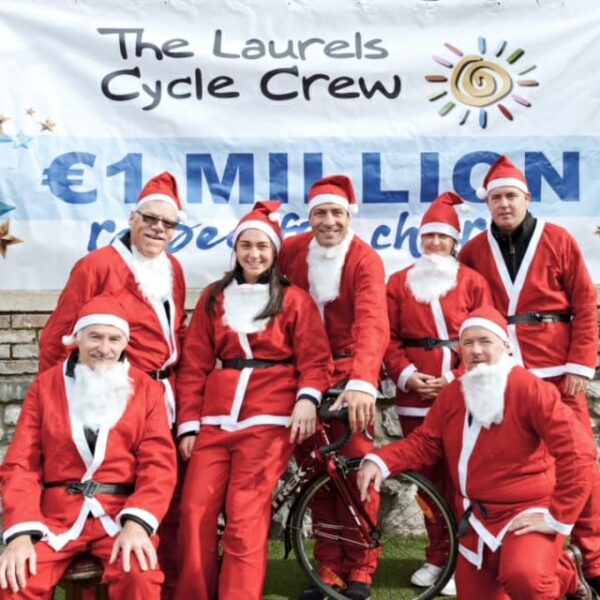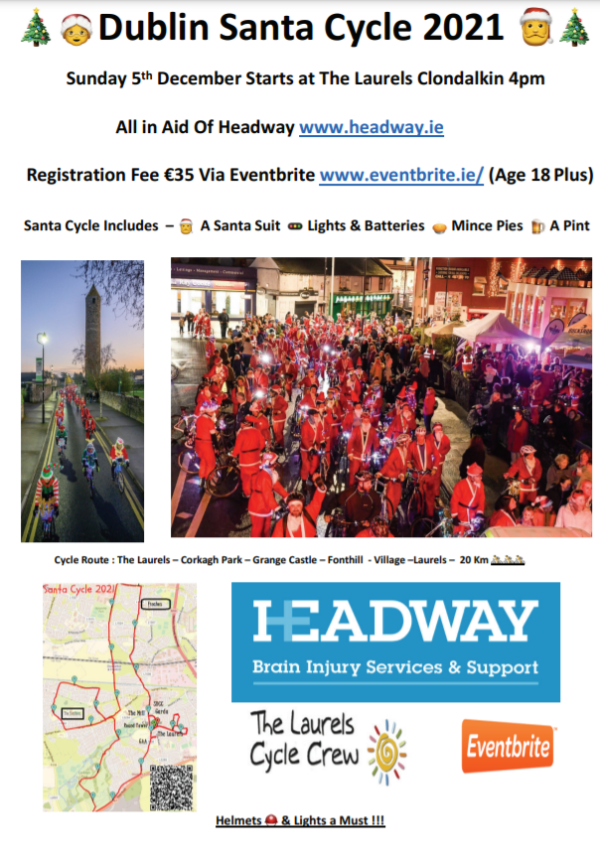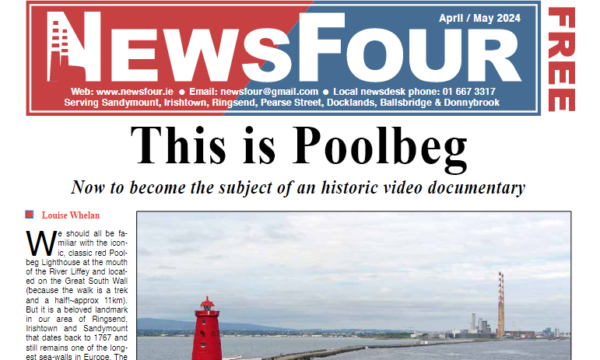
Every charity needs a little help from the public around this time of year, and why not help a worthwhile cause while being Santa-tastic at the same time? On Sunday the 5th of December at 4pm, the Laurels Cycle Crew will set off on their way, cycling 20km to raise money for the brain injury charity Headway.
Newsfour spoke to one of the members of the Laurels cycle crew, who also has been a recipient of help from Headway, after having had a stroke. Derek has been involved with the Laurels cycle crew for over ten years and because Headway is a charity that has helped him overcome so much through their rehabilitation and recovery programs, it was an obvious choice for him to put the charity forward. Derek has kindly shared his own inspirational story of recovery from a stroke, from going from being unable to read, write and speak, to being able to take a front seat in fundraising and finding a love of cycling, thanks to the help of Headway.
N4: You’re cycling with the Laurels Cycle Crew in aid of Headway. How did that come about?
Derek: I got involved with the Laurels in 2010 and asked would I cycle to raise funds for Our Lady’s Children’s Hospital. So I did, on a mountain bike it was bloody hard! Originally, Damien Long and Denis McCarthy started the Laurels club in Clondalkin to make a real difference in children’s lives who have been unfortunately living with scoliosis, they got in contact with Our Lady’s Hospital (CMRF) and Straight Ahead to provide surgery, support and medical equipment for children with orthopedic conditions. Damien & Denis also got involved with the Ciaran Foundation to support & raise funds for De Fibs for all Schools in the Clondalkin area this was delivered.
I got the cycling bug & loved it & got on with the committee, my main position was operations logistics & sales fundraising. The Laurels Committee were looking for different things for charity. I brought forward the thought of doing something for Headway, obviously this was close to my heart now. Two years ago Kieran Loughran (CEO) met our committee and there was a real connection and we knew we could work together & make this a reality. A partnership had been born but it was paused with COVID-19. A three year plan with Headway & the Laurels was then created with a target of a quarter of a million by the end.
Originally, Damien Long and Denis McCarthy started in the Laurels in Clondalkin to make a real difference in Children’s lives who have been unfortunately living with scoliosis, they got in contact with Our Lady’s Hospital (CMRF) and Straight Ahead to provide surgery, support and medical equipment for children with orthopedic conditions. Damien & Denis also got involved with the Ciaran Foundation to support & raise funds for De Fibs for all Schools in the Clondalkin area this was delivered.
N4: If you don’t mind me asking, when were you diagnosed with a brain injury?
Derek: I had a triple by pass when I was 38, in October of 2009. It was in St Vincent’s hospital that I collapsed and luckily, I was in the right place at the right time. I had new pipes, bits and bobs and medications and ready to rock & roll after two months. But unfortunately life had a different plan for me, maybe they reckoned I needed something really special? In June 2013 I was shattered into a million pieces. I had a stroke, that resulted in aphasia (damage to the part of the brain that processes language and comprehension). My communication was gone, everything that I loved was destroyed, writing, reading and talking. Trying to be understood and to make sense felt impossible, I was finished. Suicide was a real option at the start.
Derek went on to very honestly and bravely explain that when people spoke too fast to him or asked him to remember too much at one time, that it was like they were speaking an alien language to him. He was very distraught, but found a way to cope and recover once his writing ability returned. He went on to carry a note pad around everywhere with him. If he found himself in a pressured or confusing situation with someone speaking too quickly, he would calmly ask them to slow down, explain his aphasia and get them to write down what they were saying, whether that be a price of an item, or a term he didn’t catch the first time. This level of acceptance and calmness shows immense courage on Derek’s part and really shows the world, as Headway promotes, that there is life after brain injury. Resilience can be both innate and learned.

N4: How has life been for you, post brain injury?
Derek: Now I had two options I could feel sorry for myself which I did! Or I could start again and try to rebuild my life. I was very lucky to get into the NRH (National Rehabilitation Hospital) in October 2013. I spent eight weeks there, with a key speech therapist for the alphabet and I got back driving. A local counsellor Ronan Grimshaw helped me too. I looked to Headway for help in 2014 and joined the Headway Choir. I got involved with PowerPoint talks on Headway’s, “there is life after all with a brain injury” campaign too. I used to work for Cuisine de France, and I think acknowledgement that I could never go back to that life was a big thing for me, that I’m going to have to embrace my new life and push forward. That’s hard for anybody. Everybody changes, from when they’re twenty to when they’re in their forties, but it’s gradual. With a brain injury the change is just like a bang, one day you’re grand and the next your life has changed.
N4: What would you like the public to know about brain injury?
Derek: That survivors had a life before you know? But it was snatched away in the blink of an eye. I wish “normal” people, I hate to say normal people because that’s unfair to them too, but if they would never just assume that what they see before them, is the full situation for a person. People who have not recovered fully from strokes or brain Injuries and people in wheelchairs are in the main area of awareness for this, and people will try to support and help them. But hidden disabilities are harder, as they can’t really see what is behind the surface. The #iseebeyond campaign was amazing but much more is needed for awareness. For example, a bar man who shouted at me, “come on what do you want” I have to say … I have a little issue with communication, if you relax a little I can also relax and we can be ok, It would be easier on both sides. But it is also important that the individual with the brain issue should let people know that this is not exactly straightforward and explain their situation if they can. Another example for me is, the person in the bank PTSB, said it was fine as I let him know I had a little issue with communication, with numbers and specific details or instructions. So it was good as we could take the time and understand and communicate.
N4: Do you feel like the public are understanding of people with brain injuries? What would you like to see as a change from how the public respond to people with brain injuries?
Derek: In the main I think so yes. Like I said above, let people know of your difficulties. But also, if an individual looks ‘normal’, so, walks and looks like a duck, well then it must be a duck? Is it that right? Well actually no, not for any hidden disabilities.
N4: Do you feel like Dublin is an accessible city for people with a brain injury?
Derek: For me I am pretty ok, but I can be under pressure with certain things like instructions, directions, specific information. Such as payments, shopping when paying, train tickets, parking, communicating with taxi men, banks, online and trying to communicate with the right person as opposed to a computer. My little friend is my notepad and a pen I just ask and also ask them to write it down it works for me. I have to use all the skills that I have and everything needs to be planned! I have a friend, Gary Kearney, he’s the spokesperson at Disability Federation of Ireland and deals with disability issues like parking, trucks, cars and bikes being blocking pathways for disabled people. I would say that because of my experience, I would be very much more aware of different people’s difficulties now, even with their communication. The most simplest thing I would say to people without a hidden, or visible disability to be aware of, is to just ask a person if they’re ok with a bit of a smile if they’re struggling or taking a minute to help or allow someone struggling getting on a bus, it makes a difference. I remember one time, I was struggling with a train ticket and getting stressed and a person just came up and gave me a hand with it, took the ticket and helped me out.
N4: Do you think the government has sufficient help in place for charity funding, personal recovery assistance, back to work assistance or any aid needed by a person with a brain injury?

Derek: It’s never enough. Charity Funds are constantly under pressure to support people. Recovery assistance with brain injuries is really a long, long road and it needs to improve in trying to rebuild some degree of normalcy for people. But if people realised that people with brain injuries can bring something positive to help and be creative for businesses then this could be a win/win on both sides. We do have skills that can support & make a real difference within businesses and industries, not just sweeping the floor or getting a make up job for us and just be a number, and the businesses are like “oh look what we are doing, isn’t this great for them”. Artists, painters, poets, innovators, gardening (Sheds), logistics sales, any of these types of jobs would help a person with a brain injury feel like they’re a true part of society.
The Laurel’s Santa Cycle is on December the 5th, in aid of the brain injury charity Headway, who help people recover from different degrees of brain trauma everyday. If you would like more information about Headway’s services, please visit the link below.
There’s still time to sign up and get involved, the cost is €35 and you can register through the Eventbrite link below. Remember to be safe and wear lights and a helmet!
Eventbrite: https://www.eventbrite.ie/e/dublinsantacycle-2021-tickets-190931339777?aff=ebdssbdestsearch
Headway information: https://headway.ie/
Call the Headway helpline on 1800 400 478, or email them at
helpline@headway.ie to get in touch with the charity.



